Saleh Malas | Ninar Khalifeh
“At 2:00 a.m., on 17 or 18 July, a joint patrol of the Internal Security Forces (Asayish) and the anti-terror units (YAT)— affiliated with the Syrian Democratic Forces— raided my brother Barzan Hussein Muhammad’s house, located in the town of al-Ma’badah/Girkê Legê, in al-Hasakah’s countryside. The patrol arrested him. They did not present him with a warrant, or even inform him of his charges,” Koulal, Barzan’s brother, told Enab Baladi.
Koulal added that the arrest of Barzan, known by his nickname Barzan Liyani, was horrifying to the family, particularly because it was sudden and took place late at night.
He added that Barzan’s house was raided by a group of gunmen in masks, who did not introduce themselves or even tell the family why they were storming their house. Worse yet, one of the armed men had a camera and filmed the arrest, headless of the family’s privacy and ignoring their pleas that he stops recording.
“My brother Barzan is a journalist. He works for the Zagros TV-broadcasted ARK program. He is also a member of the Kurdish Writers Union and a member of the sub-committee of the Kurdistan Democratic Party- Syria (KDP-S). My brother and three other men were arrested around the same time. These are journalist Izzeddin Malla, Muhammad Daham Ayo, a member of the PDK-S’s Advisory Board, and Muhammad Saleh Shalal Ahmad, a member of the PDK-S’s Regional Council.”
At the time of writing, only journalist Malla was released, while the three other detainees were still held in detention.
Pertaining to the charges, Koulal said that there are no obvious reasons why the four were detained, adding that Malla, following his release, said that they were not subjected to interrogation and that the SDF’s security services only registered their names.
The SDF has been militarily in control of northeastern Syria for seven years, leaving the 2014-founded Autonomous Administration to run the area administratively through the various civil administrative directorates they established, including local councils that operate as semi-ministries and courts, as well as police and security departments.
In 2017, the SDF, backed by the US-led international coalition, announced it captured the last towns that the Islamic State (IS) controlled, and enforced social justice regulations and laws.
However, these laws and regulations did not deter the SDF from carrying out arbitrary arrests against all those they considered as opponents. The SDF violated their own due processes and failed to address the gaps in the legal system they created.
In this in-depth article, Enab Baladi sheds light on arbitrary arrests in northeastern Syria and interviews eyewitnesses who had their rights violated. In the same context, Enab Baladi addresses the role of law in stopping similar violations and ensuring that they will not be repeated, in addition to the legal mechanisms that victims can use to hold accountable the perpetrators of such violations.
Nothing like justice
Koulal said that the arrests carried out by the security services of the Autonomous Administration against the PDK-S’s members are most likely retaliatory. He added that these services arrested the four as a reaction to the arrests carried out against the Democratic Union Party (PYD)’s representatives by the Iraqi Kurdistan Regional Government (KRG), which backs and funds the PDK-S.
Koulal added that the Administration had probably opted for detaining these four activists as hostages to press the KRG into releasing the PYD’s representatives.
In a report published on 11 August 2021, Syrians for Truth and Justice (STJ) covered the arrests of the four activists in northeastern Syria.
In the report, STJ interviewed some of the detainees’ relatives, who confirmed that “the security forces do not have any other reason to detain the four journalists except for their political affiliation with the PDK-S—which has a reputation for its strong opposition to the Autonomous Administration’s stance in Northeastern Syria.”
The Kurdish National Council (KNC)— under which the PDK-S operates— responded to the arrests in a statement on 18 July 2021.
The KNC said that arresting their members by the Autonomous Administration is “underestimating the public opinion, establishing a climate of repression, and cracking down on holders of different opinions.”
The KNC added that the arrests aim to “undermine the anticipated negotiations, the resumption of which has been thoroughly discussed, accompanied by optimism that an agreement would be reached to unify the Kurdish position.”
The arrests garnered international attention. Reporters without Borders (RSF) published a report on 20 July 2021, in which they renounced the arrest of the three journalists, Izzeddin al-Mala, Barzan Liyani and Muhammad Saleh.
“A death, an attack and three arrests – these serious press freedom violations show that Syria continues to be a dangerous country for journalists wherever they are and whatever the forces present there,” said Sabrina Bennoui, the head of RSF’s Middle East desk. “The Syrian tragedy has gone on for too long for journalists, who must be able to do their job without being threatened at all times.”
Responding to the RSF report, the Autonomous Administration published a clarification on 25 July 2021. In the statement, the Administration refuted the arrest accusations and blamed international organizations and institutions concerned with journalists’ rights for exploiting criminal cases within the Autonomous Administration’s jurisdiction and turning them into issues of public opinion by presenting them as assaults on journalists and media freedom.
In the statement, the administration said, “these organizations are distorting the facts and are relying on false sources for the information they use to write their reports. This actually undermines the credibility of the reports made by the majority of these organizations, some of which have even started working in favor of certain agendas.”
Notably, arbitrary arrests and forced disappearances are not unique in the areas of the Autonomous Administration because several cases have been reported before, with some including beating, torture, and deaths under torture.
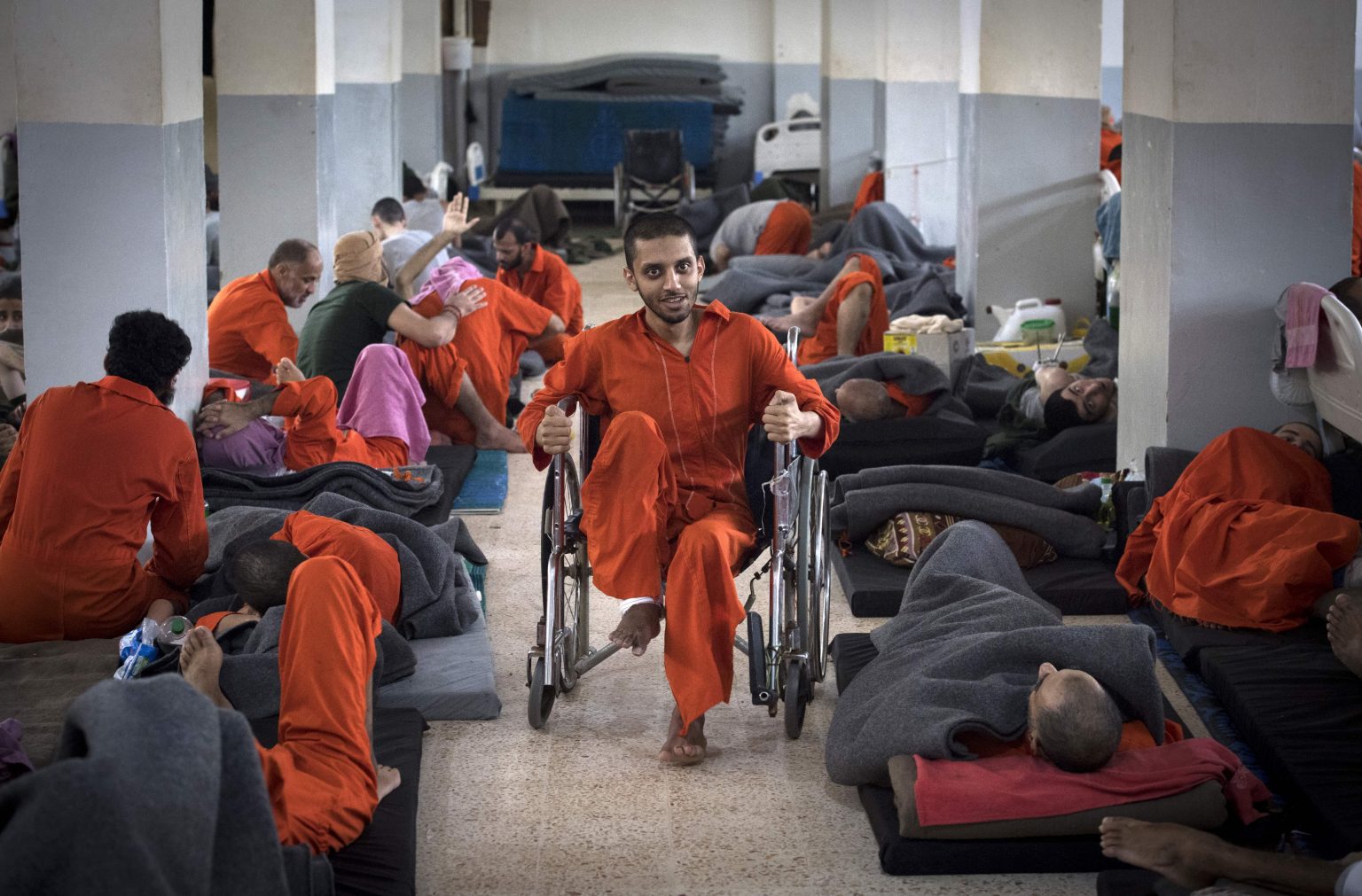
Suspects of affiliation with the Islamic State (IS) held in one of the detention facilities in al-Hasakah, northeastern Syria — 26 October 2019 (AFP\ FADEL SENNA)
Terrorism-related charges
Hassan Qassab, based in Tabqa city in the western countryside of Raqqa, was arrested by the SDF-affiliated security services on 16 August 2019 on the charge of “financing terrorism.” He was released on 29 October, 75 days into his arrest.
Qassab narrated to Enab Baladi the details of the arrest and how he was interrogated by the SDF and the US-led collation as he functioned as the coordinator of the US-funded Furat Program.
“The SDF’s Asayish arrested me one day after my wedding. They raided my house and arrested me on the charge of funding organizations to carry out terrorist activities. They did not name the involved organizations, or mention any other information about them,” Qassab recounted.
He added that “I believe that the main reason for my arrest is my work for the [Furat] Program, the larger donor in northeastern Syria. The program is in charge of power and water stations, as well as roads among others. However, the [SDF-operated] Raqqa Civil Council was attempting to get water and power contracts through affiliated private companies, such as al-Shamal Company. Keen on the principle of transparency, we [the Furta Program] sought to prevent the council from getting any tenders. After several attempts, the council realized that persuading us into the matter was useless and decided to remove us from the whole thing.”
“When I returned to Syria for my wedding—I was abroad continuing my education— I was arrested with the Furat Program’s field coordinator, along with four people from Future Makers Organization, and the chair of the board of directors of the Inmaa organizations. These are all US-funded organizations. They accused us of financing terrorism and working for foreign parties. After 17 interrogation sessions, conducted by the SDF and the US-led collation, they discovered that these charges were untrue and said that they received malicious reports. They said that these reports were fake, but they are forced to inquire and investigate into such matters,” he narrated.
Qassab said that neither he, nor any of the people detained with him, were beaten or insulted in detention, but he witnessed the torture of elderly in the prison, where the SDF also held children.
Commenting on the discriminatory treatment and the fact that they were not tortured, he said that “because we are activists. The [SDF] were keen on not distorting their image, so we would not talk about them when we were released. During the interrogation sessions, they showed us a minimum of respect and ordered the jailors not to beat us. But this treatment did not apply to all. I saw children and old people being beaten and tortured.”
Laws failing to deter arrests or kidnappings
There are many gaps in the legal system that the Autonomous Administration enforces. The system is problematic on different levels that continue to undermine due procedures and fair trial measures, particularly when addressing cases of a political character.
Muhammad Ayoub, an attorney working within the courts operated by the Autonomous Administration, told Enab Baladi that most of the time, the SDF’s security service Asayish do not present civilians with warrants upon arresting them, detaining them without an order from the public prosecutor or informing them of their right to hire a lawyer.
Lawyer Ayoub added that the prosecutor’s investigations and ensuing measures are all invalid because lawyers are not called into the court and defendants are not allowed to have lawyers when they are interrogated, or when they confess to charges or even to safeguard that their rights are not violated. Lacking lawyers adversely affects the defendant’s legal position when it comes to the purposes the law has defined for interrogation and investigation.
He added that a lawyer must be allowed access to the investigation, during interrogation or court proceedings, unless the investigator from the prosecution department decides the opposite, considering the best interests of the investigation.
Upon sentencing defendants to imprisonment, some judges overlook complaints that the investigators have obtained confessions from the defendants under torture.
Last June, the Syrian Network for Human Rights (SNHR) denounced the SDF’s forcible disappearance and Killing by torture of Amin al-Ali, pointing out that “enforced disappearance and torture have become standard strategies used by the SDF.”
Al-Ali was a member of the KDP-S’ subcommittee. According to the SNHR report “on the afternoon of Saturday, May 22, 2021, a patrol of Syrian Democratic Forces personnel (whose mainstay is the forces of the Kurdish Democratic Union Party, which is the Syrian branch of the Kurdistan Workers’ Party or PKK) carried out a raid on the home of Amin al Ali, without showing any judicial warrant, and arbitrarily arrested him.”
“The next day, the family went to the security headquarters of the SDF’s ‘Asayish’ security forces, where they learned that he had been detained by the party’s Military Prosecution division in Hasaka city, with his family members unable to obtain any official information about the charges against him throughout the entire duration of his detention, or to appoint a lawyer or visit him despite their repeated attempts,” the report added.
In January 2014, the Autonomous Administration ratified the Social Contract Charter to reinforce essential human rights.
The charter consists of nine chapters, including 95 articles, and it is considered the Administration’s constitution.
Over August, the Autonomous Administration applied several amendments to the charter, ahead of the local elections to be held across the areas they run.
Lawyer Ayoub hopes that the committee working on rewriting the charter would this time ensure to prohibit the arrest of civilians by security forces without a warrant from the public prosecutor.
In addition to the charter, the Autonomous Administration has established the Social Justice System that outlines procedures related to civil and criminal trial proceedings, general rulings, filing lawsuits and restrictions, in addition to measures of defense and litigation.
Moreover, the system addresses in detail individuals’ legal standing and the measures they should follow to file a lawsuit, and others related to issuing warrants, notifications, summons, and carrying out arrests, in addition to information on the mechanism for holding trials and court systems.
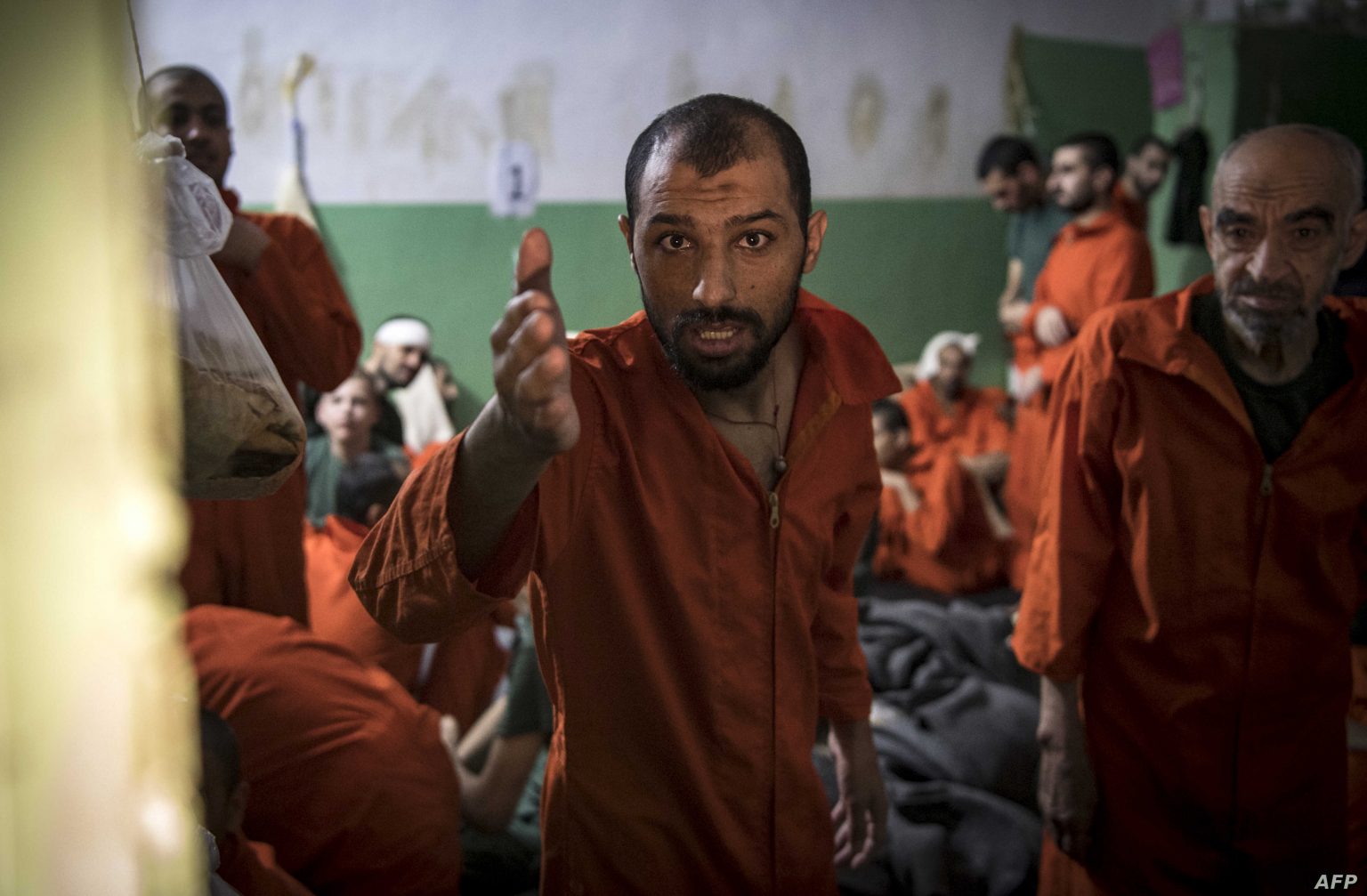
Suspects of affiliation with the Islamic State (IS) held in one of the detention facilities in al-Hasakah, northeastern Syria — 26 October 2019 (AFP\ FADEL SENNA)
Internal laws clash against reality
The Asayish seeks “to preserve order and civil and social peace in accordance with the enforced legal principles,” one Asayish member told Enab Baladi.
“We have several branches in each city or village as needed,” he added, wishing to withhold his name for security reasons.
Commenting on the arbitrary arrests that Asayish is accused of carrying out by human rights organizations, he said “It is prohibited to arrest anyone without a permission from the judicial authority, and whoever commits any violation of this system, shall be punished and tried with imprisonment according to the crime committed against the citizen.”
The Asayish’s internal regulations prohibit “the arrest of any person pending investigation for more than 24 hours, which can be extended by the competent judicial authority, provided that the period of detention does not exceed seven days so that the arrested person is then referred to the judiciary.”
“The prisons have wards, such as the central prison in Raqqa. There are 20 wards there, and each can accommodate approximately 100 people. Additionally, the prisoner is referred to the central prison after an initial arrest for purposes of interrogation only,” the Asayish member added, pointing that “the prisoner is referred to the court and then to the prison. This is the procedure at the level of the city of Raqqa.”
In addition to the Asayish member, Enab Baladi reached out to one adviser to the Autonomous Administration, Badran Jia Kurd, to gain insights on the main reasons for the arrests in the areas affiliated with the Administration, but he declined to provide an answer.
Enab Baladi also sent a request for answers to the US-led coalition, the SDF’s key backer in the region. The questions were about the coalition’s position of the violation of due process during the arrest of civilians in the SDF-controlled areas, and also about the coalition’s role in addressing these abuses. Enab Baladi did not receive an answer.
The coalition plays an essential role in supporting the SDF in military operations against IS cells, and officially supervises the implementation of service projects that fall under the “reconstruction program” in northeastern Syria.
Although the internal regulations of Asayish stipulate not to harm or arrest individuals without a court order, these regulations are not actually applied, according to a statement by the Syrian Center for Media and Freedom of Expression (SCM).
In the statement, published last July, the SCM said that the SDF practices kidnapping and enforced disappearances against political activists, and this violates the right to liberty, physical integrity, and the economic and social rights of detainees and the disappeared, as well as of their families.
| On 21 January 2014, the Autonomous Administration in the Jazira region was established, followed by autonomous and civil administrations, which were united on 6 September 2018 under the name of the Autonomous Administration of North and East Syria, as announced by the Syrian Democratic Council (SDC), the political wing of the SDF.
Several armed groups successively controlled the region, where Raqqa was the first governorate to break out of the control of the Syrian regime in March 2013. None of the groups was able to come up with a real alternative to the regime’s institutions. The SDF controlled Raqqa city on 17 October 2017, after 166 days of battles against the IS, with the support of the US-led collation which was providing aerial and logistical assistance to the forces on the ground. After the SDF managed to eliminate IS from the area, the Autonomous Administration was announced, which the SDF stated aims “to form an administrative structure that coordinates services between the regions, and to fill the administrative and security vacuum.” |
Tribes are helpless
SDF’s purely weapon-based approaches
In 2019, the SDC held a conference for Arab tribes in Ayn Issa area in the northern countryside of Raqqa.
The conference was held under the title “Syrian tribes protect Syrian society and preserve its social contract.” It was attended by tribal sheikhs from the eastern region of Syria, the former head of the PYD, Saleh Muslim, in addition to SDC officials, headed by Ilham Ahmad.
The conference was held amid rising security tensions in northeastern Syria, where several demonstrations protested the practices of the SDF, particularly violations against civilians.
Syrian tribe communities, based in the northeastern region of Syria, have often been an essential component for preserving social security, through spreading political and social awareness in cooperation with the authorities in the region.
Notably, the Asayish consists of members of tribes from the same region. These ties between the security forces and the tribe communities should supposedly make residents less intimidated by the security forces.
However, these ties have no effect in limiting or addressing the violations against the rights of detainees in northeastern Syria, according to Samer al-Ahmad, a journalist specialized in the affairs of the region east of the Euphrates River.
In fact, there is no legal or social deterrent to the inhumane behavior of the SDF in the way they deal with detainees because they “behave like the rest of the armed militias deployed in various Syrian regions,” al-Ahmad told Enab Baladi, adding that the SDF is heedless of the tribal character of the region, and “maintain their power only through weapons.”
Al-Ahmad said that the SDF worked on breaking down the region’s tribal structures, through isolating tribal chiefs and barring them from security and political decision-making processes.
Additionally, there are structural social rifts among the Arab tribes in the region. These divisions have made the members of the same tribes subject to their affiliations with any of the parties to the Syrian conflict.
Any accountability means
The Executive Director of the Syria Justice and Accountability Centre, Mohammad Al-Abdullah, told Enab Baladi about the accountability mechanisms that victims can adopt to bring Administration-affiliated perpetrators of arbitrary arrests to justice, stressing that the accountability issue must remain operative and most be sought against perpetrators from all parties to the Syrian conflict.
Al-Abdullah added that in the absence of an international accountability mechanism specific for Syrians at the present time, it is possible to resort to the United Nation’s International Commission of Inquiry, which issues public reports on Syria.
We can try to encourage the commission to adopt the files and cases of detainees of the Autonomous Administration and share them with public opinion, because this constitutes a kind of pressure and embarrassment for the Administration, in the hope of enhancing the chances of releasing the detainees and revealing the fate of the missing.
Evidence in this regard can also be shared with the United Nations’ International, Impartial and Independent Mechanism, which is working on building cases and legal files for future litigation.
On the internal level, the local litigation mechanisms represented by the Administration’s courts are not of much use, given that they are established by the Administration.
Al-Abdullah stressed that it is of paramount importance that the judiciary be independent and own effective powers. For example, if the Administration’s court orders the release of a detainee from prison, their security services must abide by this, which is not currently applied due to the absence of a clear effective judicial authority.
Public investigation into violations
Al-Abdullah indicated that in some cases where it became clear that there was torture or death under torture of detainees held by the Autonomous Administration, the investigation was not carried out in a public and transparent manner, and despite the Administration’s attempts to make some efforts in this regard, they are still clearly below acceptable standards.
He added that a press conference was recently held, bringing the forensic doctors who worked on the case of Amin al-Ali. The doctors presented their evidence, but there was no official investigation by the Administration into the incident.
Al-Ali’s family said that he was subjected to torture that led to his death, and had published pictures and videos showing the effects of torture on different parts of his body, which the Autonomous Administration denied, attributing his death to “a stroke.”
Al-Abdullah said that the only realistic solution available now is to resort to political pressure on the Administration, either in the form of recommendations, “that [arrests] harm you and you should not arrest these people,” or through pressure from allied governments, whether the US, France, or Sweden, who have been sought in different cases of arrest, including when journalist Hossam al-Qass was arrested. He was released as a result of rapid American-French pressure on the Administration.
Addressing terrorism separately
Al-Abdullah pointed out that arbitrary and political arrests tarnish the image that the Autonomous Administration is working to build and promote, and undermine their attempt to present themselves as an authority of law that advocates peace.
On the other hand, arrests are taking place in the Administration-held areas on the pretext of “terrorism” due to the presence of individuals or cells affiliated with IS in the region. Such arrests must be carried out with absolute transparency. The Administration has to evade cases of political or arbitrary arrest under the cover of “fighting terrorism.” In the past, civil activists were arrested on claims of being IS cells and were then released after several weeks.
He added that that the issue of combating “terrorism” and capturing detainees on related charges is a thorny and complex matter, and most countries have failed to deal with it. For example, Iraqi authorities carried out political arrests and liquidations on charges of belonging to IS, and the Syrian regime continues to arrest and call civil activists “terrorists” and transfer them to the “terrorism” court.
The People’s Defense Court (Court of Terrorism) is one of the social justice institutions in the Autonomous Administration cantons and was established at the beginning of 2014, purportedly to look into the crimes committed against the people of northeastern Syria.
He stressed that the lack of transparency in this framework and the failure to promote and protect freedoms is causing the Administration to slip towards the behavior of the ruling regimes in the region, which poses a permanent danger.
if you think the article contain wrong information or you have additional details Send Correction
النسخة العربية من المقال
-
Follow us :













 A member of the Syrian Democratic Forces (SDF) serving guard in a prison in al-Hasakah province in northeastern Syria — 29 October 2021 (AFP)
A member of the Syrian Democratic Forces (SDF) serving guard in a prison in al-Hasakah province in northeastern Syria — 29 October 2021 (AFP)





 A
A
A
A
A
A
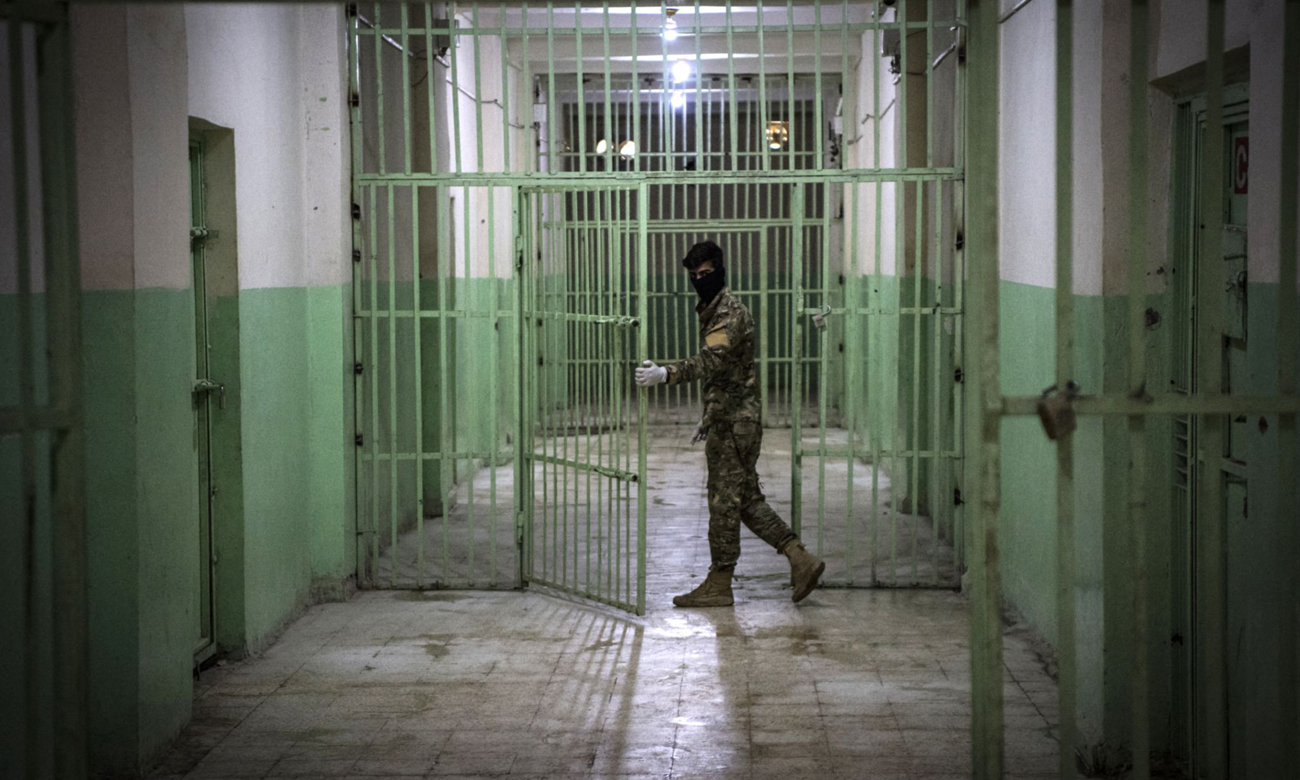
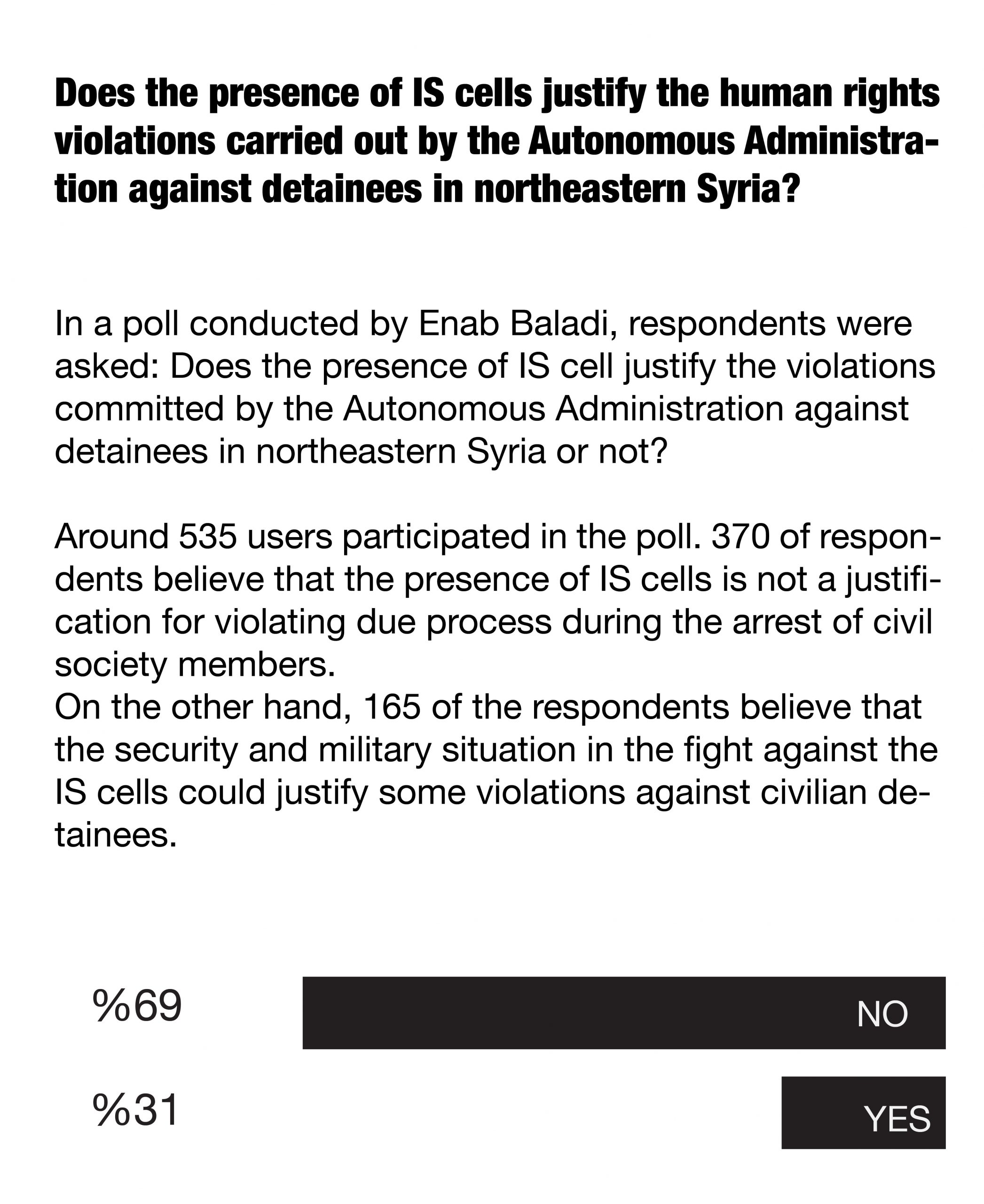
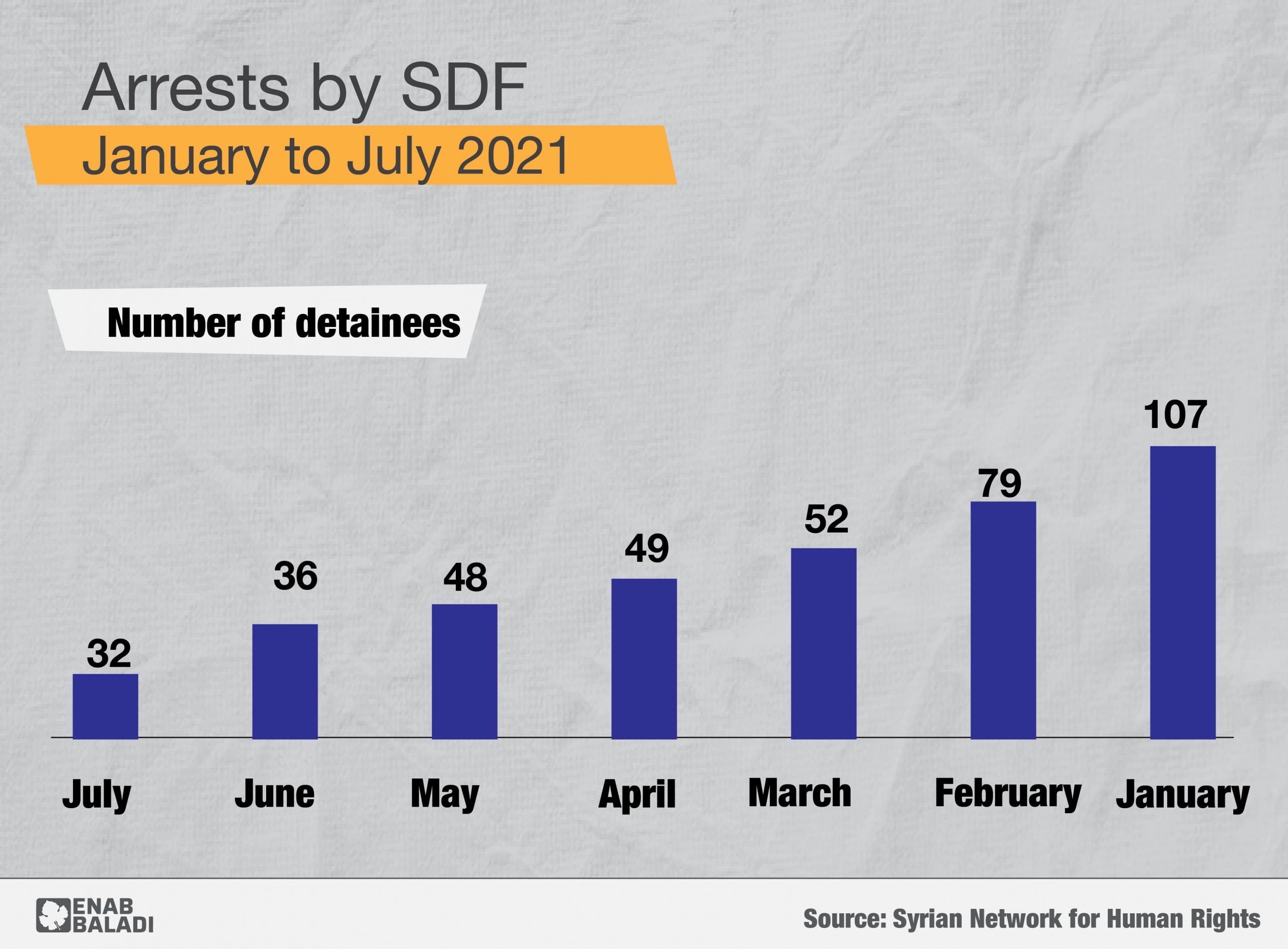
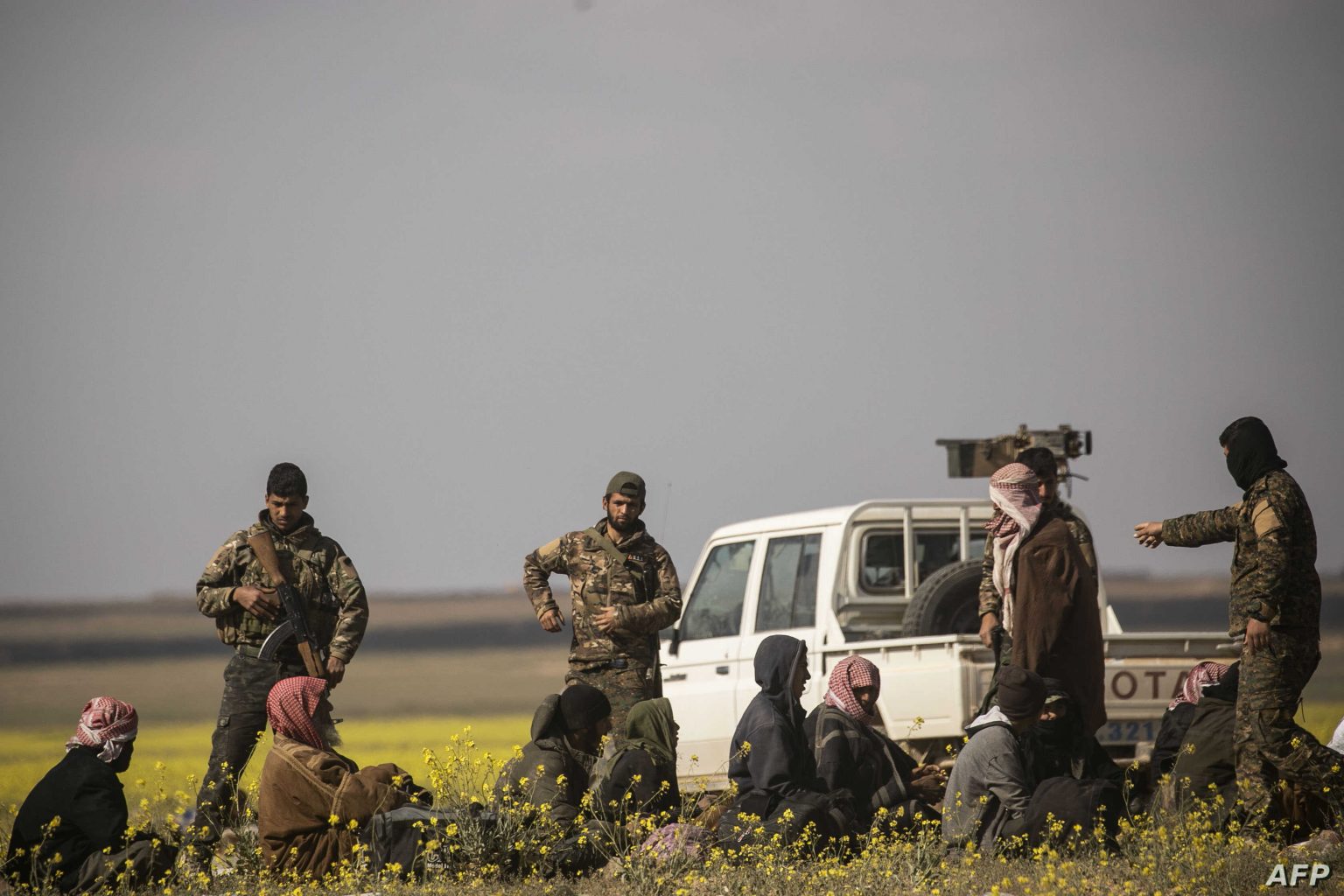







 More In-Depth
More In-Depth